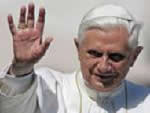|
Pope Benedict XVI- Angelus |
 Angelus
Message
Angelus
Message
On St. Martin of Tours
"Generous Witness of the Gospel of Charity"
H.H. Benedict XVI
November 11, 2007
www.zenit.org
Dear Brothers and Sisters!
Today, Nov. 11, the Church remembers St. Martin, bishop of Tours,
one of the most celebrated and venerated saints in Europe. Born
around 316 to pagan parents in Pannonia, present-day Hungary, he was
directed by his father to a military career.
When he was still an adolescent, Martin encountered Christianity
and, overcoming many difficulties, he registered among the
catechumens to prepare himself for baptism. He received the
sacrament around the age of 20 but still had to remain for some time
in the military, where he gave testimony to his new way of life:
Respectful and understanding toward all, he treated his servant as a
brother and he avoided vulgar entertainments.
Leaving military service, he went to stay with the holy Bishop
Hilary at Poitiers in France. Ordained deacon and priest by Hilary,
Martin began a monastery at Liguge with some disciples. Martinís is
the oldest known monastic foundation in Europe. About 10 years
later, the Christians of Tours, being without a pastor, acclaimed
Martin bishop. From that point on, Martin dedicated himself with
ardent zeal to the evangelization of the countryside and the
formation of the clergy.
Although many miracles are attributed to him, St. Martin is famous
above all for an act of fraternal charity. While still a young
soldier, he met a poor man along the road who was frozen and
trembling from the cold. Martin took his own cloak and cutting it
with his sword, gave half of it to the man. That night Jesus
appeared to Martin in a dream, smiling and wrapped in the cloak.
Dear brothers and sisters, St. Martinís charitable gesture inscribes
itself in the same logic that moved Jesus to multiply the loaves of
bread for the famished crowds, but above all to leave himself in
food for humanity in the Eucharist, supreme sign of Godís love, "sacramentum
caritatis." It is in the logic of sharing that the love of neighbor
is concretely expressed. May St. Martin help us to understand that
it is only through a common commitment to sharing that it is
possible to respond to the great challenge of our time: that of
building up a world of peace and justice in which every man can live
with dignity. This can happen if a global model of authentic
solidarity prevails, one that is able to assure all the inhabitants
of the planet food, water, necessary medicines, and also work and
energy resources, as well as cultural goods and scientific and
technological knowledge.
We turn now to the Virgin Mary to implore that she help all
Christians to be, like St. Martin, generous witnesses of the Gospel
of charity and tireless builders of solidary sharing.
[After praying the Angelus the Holy Father greeted those who were
present in various languages. In Italian he said:]
Lebanonís national assembly will soon be called to elect the new
head of state. As numerous initiatives undertaken in recent days
have shown, this is a crucial moment on which depends the very
survival of Lebanon and its institutions. I make my own the concerns
recently expressed by the Maronite Patriarch, His Beatitude Cardinal
Nasrallah Sfeir, and his desire that the new president recognize all
Lebanese. Together let us implore Our Lady of Lebanon that she
inspire in all the parties involved the necessary detachment from
personal interests and a true passion for the common good.
[Translation by ZENIT]
[In English he said:]
I extend heartfelt greetings to the English-speaking visitors here
today. At this time the Church remembers Saint Martin of Tours, the
saintly monk and bishop who was moved with such great compassion for
the sufferings of the poor. Recalling the occasion when he cut his
cloak in two, and gave one half to a poor man, we resolve to follow
his example by sharing what we have with those less fortunate than
ourselves. Upon all of you, and upon your families and loved ones at
home, I invoke Godís abundant blessings.
© Copyright 2007 -- Libreria Editrice Vaticana
This page is the work of the Servants of the Pierced Hearts of Jesus and
Mary